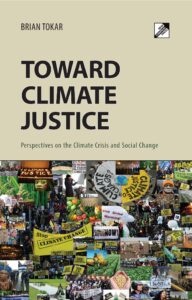 The Institute’s Climate Justice Project, based in central Vermont, brings the critical and reconstructive outlook of social ecology and our years of experience with organizing and direct action, into local, regional and national campaigns to address the global climate crisis. Our focus is on dissecting root causes and advancing democratic, community-centered alternatives.
The Institute’s Climate Justice Project, based in central Vermont, brings the critical and reconstructive outlook of social ecology and our years of experience with organizing and direct action, into local, regional and national campaigns to address the global climate crisis. Our focus is on dissecting root causes and advancing democratic, community-centered alternatives.
A central goal in recent years is to support the continued evolution and increased unity of grassroots campaigns in Vermont and throughout our region to address the underlying causes of global climate disruptions. Even though many people appreciate the severity of the emerging climate crisis and politicians generally acknowledge the problem, fossil fuel interests continue to push to expand operations and infrastructure while undermining sensible measures to reduce energy use. Frontline communities throughout our region are standing up to industry plans to build more pipelines and transport oil over train lines. New alliances are emerging with a resurgent student movement, progressive elements of organized labor, and rising grassroots movements for racial justice.
The project’s main accomplishments since its founding in 2007, include:
- We helped launch and provide organizational support for the first US-based national network on climate justice, the Mobilization for Climate Justice from 2008-2010, in collaboration with the Global Justice Ecology Project, Rising Tide North America, and others.
- Established and supported the Climate SOS network (2009-2011), bringing together activists and critically-minde
 d scientists to explain and demonstrate progressive opposition to market-oriented false solutions to reducing carbon pollution. Climate SOS offered a consistent, environmentally-centered voice challenging the proliferation of carbon markets that were supported by many mainstream environmental groups and the Obama administration. We challenged the proliferation of biofuels and biomass energy as false solutions to the climate crisis and organized interventions at two events in New York City — a UN seminar during the lead-up to the 2009 Copenhagen climate conference and a major corporate carbon trading conference in 2010 — among other activities.
d scientists to explain and demonstrate progressive opposition to market-oriented false solutions to reducing carbon pollution. Climate SOS offered a consistent, environmentally-centered voice challenging the proliferation of carbon markets that were supported by many mainstream environmental groups and the Obama administration. We challenged the proliferation of biofuels and biomass energy as false solutions to the climate crisis and organized interventions at two events in New York City — a UN seminar during the lead-up to the 2009 Copenhagen climate conference and a major corporate carbon trading conference in 2010 — among other activities.
- Contributed our extensive experience with Vermont Town Meeting organizing to 350Vermont’s two-year resolution campaign to prevent the pumping of oil from Canada’s tar sands through an aging Vermont pipeline, as well as a statewide Town Meeting campaign to shut down the Vermont Yankee nuclear power plant. In 2018-19 we supported 350Vermont’s effort to pass climate solutions resolutions in 55 Vermont towns, with a majority of these calling for an end to the expansion of fossil fuel infrastructure in Vermont.
- Helped sustain a strong working alliance of grassroots Vermont organizations committed to climate justice, joining with 350VT, Rising Tide VT, the Vermont Workers Center, Just Power/Protect Geprags Park (local landowners challenging a proposed Champlain Valley fracked gas pipeline), and several student groups from across the state. We were centrally involved in organizing a Northeast Climate Justice Gathering (with a parallel arts convergence, titled The Make) in northern Vermont in August 2014 and the Northeast Climate Organizers Summit in western Massachusetts in April 2015, with more than 150 participants coming from as far away as Montreal, Pittsburgh and Baltimore. We participated in and provided organizational support for a regional and national day of action vs. expanded fossil fuel transport by rail and pipelines.

- Produced numerous articles, book chapters, educational workshops, conference panels, and presentations, as well as two editions of the book, Toward Climate Justice: Perspectives on the Climate Crisis and Social Change, published in 2010 and 2014 by New Compass Press. We are currently editing a new book, Climate Justice and Community Renewal: Campaigns and Strategies from the Frontlines, which includes contributions from writers on the front lines of climate resistance and the creation of living alternatives in more than a dozen countries on five continents, and is scheduled for publication in 2020.
- Communicated social ecology’s distinct contributions to the emerging climate movement, drawing upon 40 years of experience advocating for renewable energy, challenging environmental business-as-usual, and advancing a revolutionary vision for the ecological renewal of society.

